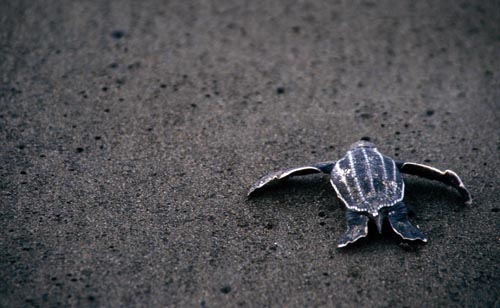The Death of a Conservationist Who Fought Poachers and the Drug Trade That Funds Them
Conservationist Jairo Mora Sandoval’s passion for protecting sea turtles likely cost him his life

A leatherback sea turtle laying her eggs. Photo: Laurens
Conservationist Jairo Mora Sandoval’s passion for protecting sea turtles likely cost him his life. Sandoval was always outspoken against wildlife poachers and their link to drug trafficking, the New Scientist explains:
In articles published in April in La Nación, Costa Rica’s leading newspaper, Mora Sandoval and other conservationists highlighted the links between drug trafficking and wildlife poaching – including a disturbing trend for crack-addicted poachers to be paid for turtle eggs with drugs.
Turtle eggs are believed by local people to be an aphrodisiac, and retail for about US$1 each….Given that a single nest can contain 80 or more eggs, trading in turtle eggs can be a lucrative sideline for criminals employed by drugs gangs to move their products along the coast.
Sandoval was found dead on Friday, his body discarded on a beach he used to patrol for baby leatherback turtles with the non-profit conservation group Widecast, the New Scientist reports. Sandoval had been bound, beaten and shot point-blank through the head. The Huffington Post elaborates:
Mora Sandoval, 26, had been patrolling the beach along with four other female volunteers Thursday night when masked men kidnapped them. The women escaped their attackers and went to police, Chacon said.
Authorities and colleagues suspect his murder was carried out by drug traffickers working around the Costa Rican beach where Sandoval carried out his turtle research. This isn’t just a problem in Costa Rica: 2011 and 2012 saw a significant increase in the number of environmental scientists and activists murdered over the wildlife or habitats they sought to protect, Yale’s Environment 360 reports.
Most likely, drug dealers got tired of dealing with Sandoval’s efforts to protect the turtles and call attention to their illegal activities. In March 2012, traffickers raided a turtle incubation station on the beach and held the workers at gunpoint while they smashed all of the eggs. According to the New Scientist, locals later confirmed that the raid was a warning, though Sandoval did not comply.
Just weeks before his death, More Sandoval was personally threatened at gunpoint, and given a similar warning. “We said, ‘You should get the hell out of there, that’s just too much,’” says Christine Figgener, a friend who works for another turtle conservation project at Ostional, on Costa Rica’s Pacific coast.
Conservationists suspect that the police will lose interest in protecting the beach after the buzz surrounding Sandoval’s death dies down, the New Scientist reports, and they worry that the foreign volunteers who carry out much of the work will stop coming due to safety concerns.
More from Smithsonian.com:
State Department Takes on Illegal Wildlife Trade
Sloths Are Number One on the List of Illegally Traded Pets in Colombia
/https://tf-cmsv2-smithsonianmag-media.s3.amazonaws.com/accounts/headshot/Rachel-Nuwer-240.jpg)
/https://tf-cmsv2-smithsonianmag-media.s3.amazonaws.com/accounts/headshot/Rachel-Nuwer-240.jpg)